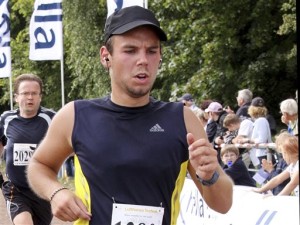Lufthansa knew that the co-pilot of the passenger plane that crashed in the French Alps last week had suffered from an episode of “severe depression” before he finished his flight training with the German airline.
The airline said Tuesday that it has found emails that Andreas Lubitz sent to the Lufthansa flight school in 2009 when he resumed his training in Bremen after an interruption of several months.
In them, he informed the school that he had suffered a “previous episode of severe depression,” which had since subsided.
The airline said Lubitz subsequently passed all medical checks and that it has provided the documents to prosecutors. It declined to make any further comment.
French authorities say voice recordings indicate Lubitz, 27, locked the other pilot out of the cockpit and deliberately crashed the Airbus A320 in the French Alps on March 24. All 150 people aboard Flight 9525 from Barcelona to Duesseldorf died.
The disclosure that Lubitz had told the airline he had suffered from depression before he was hired in September 2013 at Lufthansa’s budget arm Germanwings is another blow to the company’s reputation. Lufthansa CEO Carsten Spohr had said that Lubitz passed all tests and had been pronounced fit to fly.
The revelation adds to questions about how much Lufthansa and its insurers will pay in damages for the passengers who died.
It also underlines questions about how thoroughly the aviation industry and government regulators screen pilots for psychological problems.
German prosecutors say Lubitz received psychotherapy before obtaining his pilot’s license and that medical records from that time referred to “suicidal tendencies.” They have given no dates for his treatment, but said visits to doctors since then showed no record of any suicidal tendencies or aggression against others.
They also have found torn-up sick notes from doctors, including one that would have kept Lubitz off work on the day of the crash.
The latest disclosure “really does suggest a potential problem with the airline’s oversight of this aviator,” Alan E. Diehl, a former air safety investigator with the NTSB and a former scientist for human performance at the Federal Aviation Administration said.
Diehl said the global shortage of pilots might be leading to lax hiring standards. Every week, there are nearly 30 new jets rolling off assembly lines. Each one requires airlines to hire and train at least 10-12 new pilots.
Report by the Associated Press.
 CGTN America
CGTN America In this Sunday, Sept. 13, 2009 photo Andreas Lubitz competes at the Airportrun in Hamburg, northern Germany. Germanwings co-pilot Andreas Lubitz appears to have hidden evidence of an illness from his employers, including having been excused by a doctor from work the day he crashed a passenger plane into a mountain, prosecutors said Friday, March 27, 2015. (AP Photo/Michael Mueller)
In this Sunday, Sept. 13, 2009 photo Andreas Lubitz competes at the Airportrun in Hamburg, northern Germany. Germanwings co-pilot Andreas Lubitz appears to have hidden evidence of an illness from his employers, including having been excused by a doctor from work the day he crashed a passenger plane into a mountain, prosecutors said Friday, March 27, 2015. (AP Photo/Michael Mueller)
